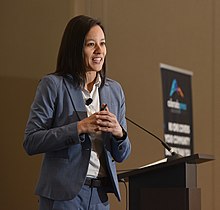User:Valereee/Vanessa Otero
| This is not a Wikipedia article: It is an individual user's work-in-progress page, and may be incomplete and/or unreliable. For guidance on developing this draft, see Wikipedia:So you made a userspace draft. Find sources: Google (books · news · scholar · free images · WP refs) · FENS · JSTOR · TWL |

Vanessa Otero is the founder of media watchdog organization Ad Fontes Media and creator of its Media Bias Chart.
Early life and education
[edit]Otero was raised in San Diego, California, and attended UCLA, graduating with a BA[1] in English.[2] She received a Juris Doctor from the University of Denver in 2013[2] and was admitted to the US patent bar in 2014[3]
Career
[edit]Otero worked for ten years in sales before attending law school.[2] After law school she worked as a patent and trademark attorney for Neugeboren O'Dowd in Boulder.[2][4]
In 2016 Otero, "alarmed" that many of her friends, coworkers, and family were sharing polarizing, low-reliability media stories when discussing politics on social media,[5][6] created a diagram to demonstrate to friends and family which media outlets were partisan.[7][8] According to Otero:[8]
In the past, national evening news programs, local evening news programs, and the front pages of print newspapers were dominated by fact-reporting stories. Now, however, many sources people consider to be ‘news sources’ are actually dominated by analysis and opinion pieces.
According to Newsy, "Otero’s chart categorizes the media landscape using two domains: facts vs. editorializing, and left- vs. right-leaning views."[6] Otero told Newsy the chart's vertical axis represented quality and the horizontal axis represented bias, saying, "In general, the better quality, best quality stuff is at the top. The lowest quality stuff is at the bottom."[6]
Otero published the chart on her blog, All Generalizations Are False, after which it became a viral phenomenon and was adopted as an Internet meme on the Imgur image sharing service in December 2016.[9] In 2018, after the chart had gone viral, she told MarketWatch, "I think the extremes are very toxic and damaging to the country. These extreme sources play on people’s worst instincts, like fear and tribalism, and take advantage of people’s confirmation biases."[8]
In February of 2018[1] she founded Ad Fontes Media, a media watchdog organization, and by 2019 was releasing similar charts based on local media outlets.[7] In April of 2018 she launched a crowdfunding campaign to "scale up" the technology.[10] According to Otero, analysts with Ad Fontes read more than 10 "competing news stories" when assessing them on spectrum of accuracy, rating them on a scale of factuality.[7]
Personal life
[edit]Otero moved to Colorado in 2008 and lives in Boulder.[2][7] She enjoys snowboarding and likes dogs.[2] She is a member of the board for NPR radio station KUNC[2] and is on the advisory board for Media Literacy Now.[11]
References
[edit]- ^ a b "Vanessa Otero bio". Ad Fontes Media. Retrieved 2024-01-02.
{{cite web}}: CS1 maint: url-status (link) - ^ a b c d e f g "Vanessa Otero bio via KUNC". KUNC. Retrieved 2024-01-02.
{{cite web}}: CS1 maint: url-status (link) - ^ "Find a patent practitioner". United States Patent and Trademark Office.
- ^ Hutchins, Corey (2020-06-27). "MEDIA: A new site covering politics and policy, Colorado Newsline, staffs up for July launch". The Colorado Independent. Retrieved 2020-07-12.
- ^ Langlois, Shawn (26 August 2019). "After checking out this chart of media bias, we might have to agree to disagree". MarketWatch. Retrieved 2020-04-20.
{{cite web}}: CS1 maint: url-status (link) - ^ a b c Thomas, Evan. "This Map Can Help Navigate The Partisan Media Landscape: Vanessa Otero set out to rank an ever-growing partisan media landscape, with the belief that an informed public is a better public". Newsy. Retrieved 2020-04-20.
{{cite web}}: CS1 maint: url-status (link) - ^ a b c d Peck, Andrea (2019-05-31). "A Boulder Lawyer Wants to Help You Become a Smarter News Consumer". 5280. Retrieved 2020-04-20.
{{cite web}}: CS1 maint: url-status (link) - ^ a b c Langlois, Shawn (21 April 2018). "How biased is your news source? You probably won't agree with this chart". MarketWatch. Retrieved 2020-04-20.
{{cite web}}: CS1 maint: url-status (link) - ^ Little, Hannah Byrd (Sep–Oct 2018). "Media Literacy: A Moving Target" (PDF). Knowledge Quest. 48 (1). American Association of School Librarians: 18–20. Retrieved 24 April 2020.
{{cite journal}}: CS1 maint: date format (link) - ^ "The woman behind that media bias chart you've probably seen is crowdfunding it now". Nieman Lab. Retrieved 2020-04-20.
{{cite web}}: CS1 maint: url-status (link) - ^ "National Advisory Council for Media Literacy Now". Media Literacy Now. Retrieved January 2, 2024.

